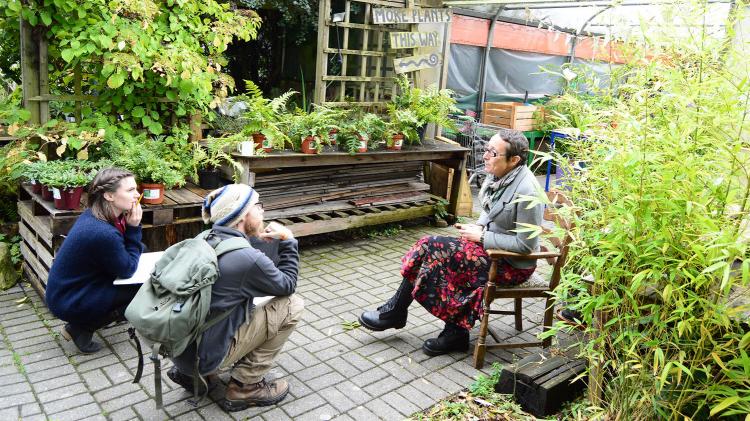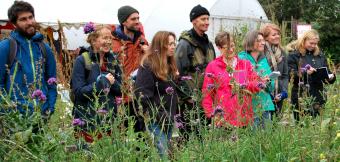
Start a conversation
Talking about climate change is powerful, but can be tough. Discussing the actions you've taken, joining conversations on gardening, commuting or DIY, and suggesting that decisions include climate impact are good ways in. You'll have more success if you listen and respect other people's views.

Making conversations successful
Talking about climate change with people who aren't already taking action is tough, and can provoke difficult responses. They may shut down, lash out, or grill you. For many, climate change seems a direct challenge to their lifestyle which provokes feelings of powerlessness, guilt, anxiety and confusion. Others have simply avoided thinking about it because it seems overwhelming. Some people will assume you're an expert and ask you all sorts of technical questions. A few will be actively hostile about the whole idea of climate change.
General rules for conversational success include:
- Pick your moment carefully, and avoid putting people on the spot
- Be prepared to listen
- Share the responsibility for climate change: ask things like 'how could we change that?'
- You don't have to cover everything; aim for an interesting, respectful conversation that leaves the door open for next time
- Look for common ground, not what divides you
- A conversation always goes better if you have an understanding of where the other person is starting from.
In 2018, Yale research identified six audiences that respond to climate change in distinct ways:
The Alarmed understand the reality and seriousness of climate change. They’re taking individual, consumer and political action to address it.
The Concerned understand the seriousness, but haven’t yet taken personal action.
The Cautious, the Disengaged and the Doubtful represent different stages of understanding and accepting the problem. None are actively involved.
The Dismissive believe that man-made climate change isn’t happening. They’re active opponents of efforts to reduce greenhouse gas emissions.
Early in the conversation, determine which group best matches your conversational partner/s.

Four approaches to more successful conversations
Leading by example. This is perhaps the easiest approach, and one that's mentioned in a lot of the 52 Actions. It means you take a climate action first and then have a conversation about it afterwards. This could be when someone comments on your new solar panels/ compost heap/ flood defences. It could also be part of a general conversation about commuting, gardening, DIY or your weekend, or a planned conversation where you invite people to celebrate what you've achieved at a house-warming, harvest festival or garden party. The more passionate, knowledgeable and clear you are, the better the conversation is likely to go.
Make it formal. Instead of a casual chat, you could organise a formal meet up. People will arrive expecting to talk about climate change, and will be curious and ready to learn. Be prepared to listen and approach it as a conversation, not a lecture. The Sustainability Exchange offers a step-by-step guide to facilitating a structured, 70 minute conversation with a group of five to ten people. There is no need for specialist knowledge about climate change or facilitation experience, just a desire to have a constructive conversation.
Nudging the normal. Every day, organisations and individuals replace heating systems, buy new vehicles, make property improvements, do up gardens and make travel arrangements. Use the opportunity to 'nudge the normal' towards including climate impact in these decisions. People are already committed to taking action, so all you have to do is nudge it towards being a climate action. Most people will be happy to discuss a 'green' option. Emphasising the long term cost savings and the PR possibilities can help. This is a good way to start a climate conversation with your employer; the best outcome would be the creation of strong environmental policies across the organisation.
Going in cold. This is the toughest approach; starting a climate conversation with an acquaintance. The Citizens Climate Lobby suggest three approaches:
- BOND: Start with shared values. What do you and your connection have in common? Are you neighbours, parents or pet owners? Do you share concerns about your community, jobs or health? Find common ground.
- CONNECT: Show why climate matters. Tell personal stories that are close to home. For example, how smoke from distant wildfires polluted the air across your state and triggered the asthma of a friend’s child.
- INSPIRE: Demonstrate working solutions. Link real-life benefits of our solution back to the shared values you’ve found. For example, healthier air means less lung disease.
They suggest open-ended prompts like, “It sounds like you’re concerned about climate change?”. You’ll quickly discover who is and isn’t likely to be effectively engaged. Remember the goal is to bond, connect and inspire; partnership not persuasion. If you don’t win over someone on the emotional level, they won’t connect with you and see your positions and solutions as persuasive.
You can watch these conversation techniques being demonstrated here.
Picture credits: 1) Mihai Surdu - Unsplash.com 2) Etienne Boulanger - unsplash.com 3) flickr.com/permaculture-association
Suggest your workplace adopts a better environmental policy
Start climate conversations with close friends and family
Organise a formal climate conversation in your community
Share your climate actions with a global community online



